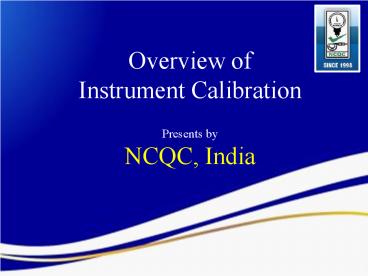Overview of Instrument Calibration - PowerPoint PPT Presentation
Title:
Overview of Instrument Calibration
Description:
NCQC is sharing information about Instrument Calibration and its requirements in organizations. This ppt presentation helps organization and management trainee to understand purpose, importance and requirements of calibration management system. – PowerPoint PPT presentation
Number of Views:910
Title: Overview of Instrument Calibration
1
Overview of Instrument Calibration Presents by
NCQC, India
2
What is Calibration?
Calibration is the activity of checking, by
comparison with a standard, the accuracy of a
measuring instrument of any type. It may also
include adjustment of the instrument to bring it
into alignment with the standard.
www.calibrationlaboratory.in
3
Why is Calibration Necessary?
It is impossible to make perfect hardware that
would not need any form of error correction. Even
making the hardware good enough to eliminate the
need for error correction for most devices would
be extremely expensive. The accuracy of network
analysis is greatly influenced by factors
external to the network analyzer. Components of
the measurement setup, such as interconnecting
cables and adapters, introduce variations in
magnitude and phase that can mask the actual
response of the device under test. The best
balance is to make the hardware as good as
practically possible, balancing performance and
cost. Calibration is then a very useful tool to
improve measurement accuracy.
www.calibrationlaboratory.in
4
Purpose of Calibration
- Calibration refers to the act of evaluating and
adjusting the precision and accuracy of
measurement equipment. Instrument calibration is
intended to eliminate or reduce bias in an
instrument's readings over a range for all
continuous values. - Precision is the degree to which repeated
measurements under unchanged conditions show the
same result - Accuracy is the degree of closeness of
measurements of a quantity to its actual true
value.
www.calibrationlaboratory.in
5
When do Instruments Need to be Calibration?
- Before major critical measurements
- After major critical measurements
- After an event
- When observations appear questionable
- Per requirements
- Indicated by manufacturer
www.calibrationlaboratory.in
6
What is Important of Calibration?
Calibration of a measuring equipment or working
standard enables the user to take note of the
deviations and errors from the nominal values so
that corrections can be made to minimize the
errors during measurement. A well-calibrated
instrument provides the confidence to the user as
well as the consumer that the service or the
product meets the required specifications and
ensures the acceptance in international market.
www.calibrationlaboratory.in
7
Requirements of Calibration Management System
- Each instrument requires
- Unique identification
- A recorded history and current calibration
status - Use appropriate for the function of the
instrument - Calibration procedures require
- Approved procedures for calibration
- Schedule for calibration
- Process range limits
- Calibration standards and test equipment
- Must be more accurate than the required accuracy
of the instrument - Traceable back to national or international
standards - Personnel
- Proof of appropriate training
- Perform within an established change management
process
www.calibrationlaboratory.in
8
Futures of Calibration System at NCQC
- Identifies instruments that can be calibrated
- Determines calibration requirements for
instruments - Establishes calibration procedures
- Develops corrective action procedures
- Documents calibration results and activities
- Supports audit trails for calibration system
www.calibrationlaboratory.in
9
About NCQC - Calibration Laboratory in India
National Centre for Quality Calibration
Laboratory The NCQC was founded in 1998 for
instrument calibration laboratory. Since then, we
have steadily grown by adding many new
facilities, capabilities including primary and
secondary instrumentation to become leading NABL
calibration laboratory in India. We provide
calibration services to our customers in either
our own environmentally controlled
multi-laboratory facility or on-site at their
location. We are NABL accredited Calibration Lab
is having wide scope of thermal, mechanical and
electro-technical instrument calibration. We had
our branches in Gandhidham, Ankleshwar,
Bhavnagar, Rajkot and Vapi.
www.calibrationlaboratory.in































